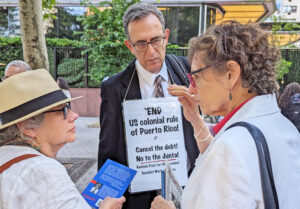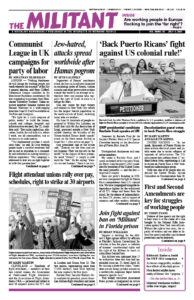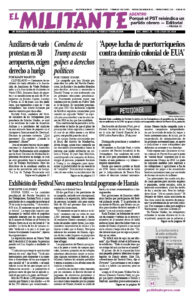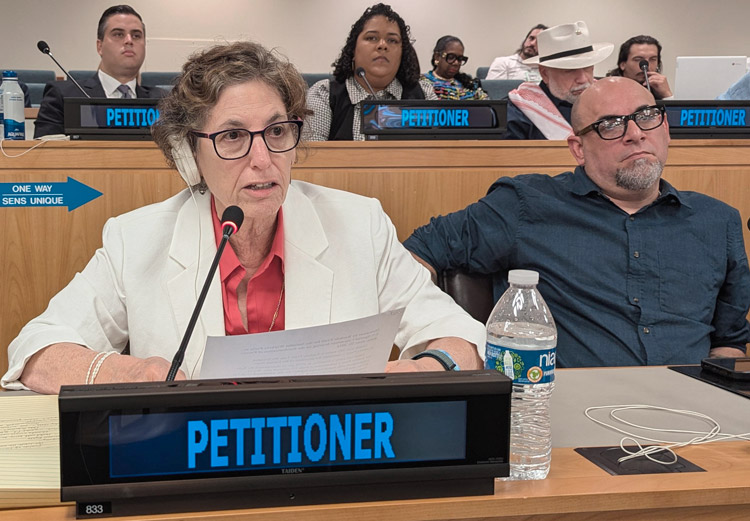Decolonization panel votes to back Puerto Rico struggle
UNITED NATIONS — “As we speak, thousands of Puerto Ricans remain without electrical power and potable water due to recent collapses of segments of infrastructure. The U.S. government does nothing about it,” testified Edwin Ortiz, representing A Call to Action on Puerto Rico, a New York-based pro-independence group.
Ortiz was one of 80 people who addressed the United Nations Special Committee on Decolonization June 20. The annual hearing takes up the status of Puerto Rico, a U.S. colony since 1898.
The majority of petitioners called for the independence of Puerto Rico. One after another explained how Washington presents Puerto Rico to the world as a “self-governing Commonwealth,” trying to disguise the fact it remains one of the few remaining colonies in the world.
That reality was reinforced in 2016, when the Barack Obama administration and U.S. Congress imposed a “financial oversight board” — the junta, as working people contemptuously call it. Its purpose is to enforce payment to wealthy U.S. bondholders on Puerto Rico’s massive debt. The junta has the power to veto all budgetary and financial decisions of the colonial regime in San Juan.
“The only thing the U.S. government cares about is to make sure the bondholders get their payments,” said María de Lourdes Guzmán of the Movement for a Sovereign Union (MUS). “The junta, together with the two colonial parties, has taken on the job of plundering our wealth and turning it over to the insatiable bondholders, while the Puerto Rican people face precarious conditions.”
The two ruling colonial parties are the Popular Democratic Party (PPD), which defends the island’s “Commonwealth” status, and the pro-statehood New Progressive Party (PNP).
Many petitioners, like Ortiz, detailed the intensified social, economic and moral crisis inflicted on the people of Puerto Rico under U.S. colonial and capitalist rule. They described how electrical blackouts are a nearly daily reality, with brutal consequences for working people, especially the elderly.
Millions face near-daily blackouts
The deterioration of the electric grid is a result of willful neglect by the capitalist rulers of Puerto Rico. They used the crisis to justify moves to sell off the debt-ridden state-owned power company. Operation of the electrical system is now largely in the hands of two private contractors, Luma Energy and Genera PR, but service has only worsened while utility rates have been hiked.
Rachele Fruit, Socialist Workers Party candidate for U.S. president, pointed to recent protests by workers on the island against the privatization of public services and pension cuts. “We join them to demand Washington cancel the debt now!” she said.
“A successful battle to end U.S. colonial rule in Puerto Rico will also strengthen working people here,” she added. (Fruit’s statement is here.)

Speakers at the hearing noted that Puerto Rico has never recovered from the social crisis triggered by the devastation of Hurricane Maria in 2017. Countless homes were destroyed and much of Puerto Rico was left without electric power for up to a year.
“Seven years after the Hurricane Maria, we still have people living in homes lacking a roof or not sturdy enough to withstand another natural disaster,” said Venecia Butler-Pérez from the environmental rights group Amigxs del MAR (Friends of the Sea).
Walter Alomar, an electrical worker and independence fighter who lives in New Jersey, described how working people on the island responded with solidarity after the hurricane, in contrast to the callous indifference of the capitalist rulers.
“I was in Puerto Rico when Hurricane Maria struck, causing over 4,645 deaths.” Hired “as a lineman repairing power lines, I witnessed the resilience of our people. We pulled together, constantly checked on each other, and shared resources.” Drawing on these capacities of working people, he emphasized, “we must demand independence for our island.”
Christina Mojica of El Otro Puerto Rico, which fights for housing rights, pointed to skyrocketing electric rates, rents and other basic living costs that drive many to emigrate to the U.S. “The root of the cause is our colonial status,” she said.
Alejandra Castrodad of the Juan Mari Brás Foundation reported the average rent in Puerto Rico is now nearly $3,000 per month, while median monthly wages are barely $2,000.
Adrián González of the Puerto Rican Independence Party (PIP) noted that 48% of the population lives below the official poverty line.
Many speakers pointed to the social impact of the economic crisis and the junta-enforced cuts in public employee jobs, wages, retiree pensions and other social protections. Some noted the devastation of the health care system. The San Juan daily El Nuevo Día recently reported 81 elderly people died while warehoused for months in local hospitals over the last year, waiting to be transferred to a nursing home after their government-funded hospital coverage was cut.
Garvin Sierra, an artist, said the government proposes to cut the University of Puerto Rico’s budget by another $100 million, which “will jeopardize the university’s Museum of History, Anthropology and Art,” part of the Puerto Rican people’s cultural patrimony.
Shariana Ferrer-Núñez of the Colectiva Feminista en Construcción, a Black women’s rights organization, noted that the economic crisis in Puerto Rico falls disproportionately on working-class families headed by single women.
Rafael Olivera-Cintrón of Boricuas Unidos en la Diaspora (Puerto Ricans United in the Diaspora), pointed to Puerto Rico’s declining birthrate. “In 1999, the year I was born, more than 57,000 children were born in Puerto Rico. Last year there were less than 18,000 — the lowest number in the past 136 years.”
In addition to the pro-independence speakers, some two dozen statehood advocates testified. They acknowledged that Puerto Rico is a colony, but argued the solution is for it to be declared the 51st U.S. state. Their delegation was headed by former colonial Gov. Ricardo Rosselló. He had been forced to resign in 2019 by massive street protests sparked by the government’s callous response to the crisis.
As in previous years, the U.N. committee adopted a resolution backing Puerto Rico’s “right to self-determination and independence,” introduced by Yuri Gala, Cuba’s deputy permanent representative.
After the hearing, a rally sponsored by several pro-independence groups based in New York took place in a nearby park. It was one of several pro-independence actions that week.


